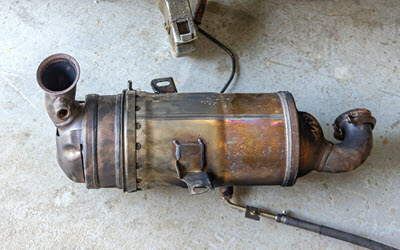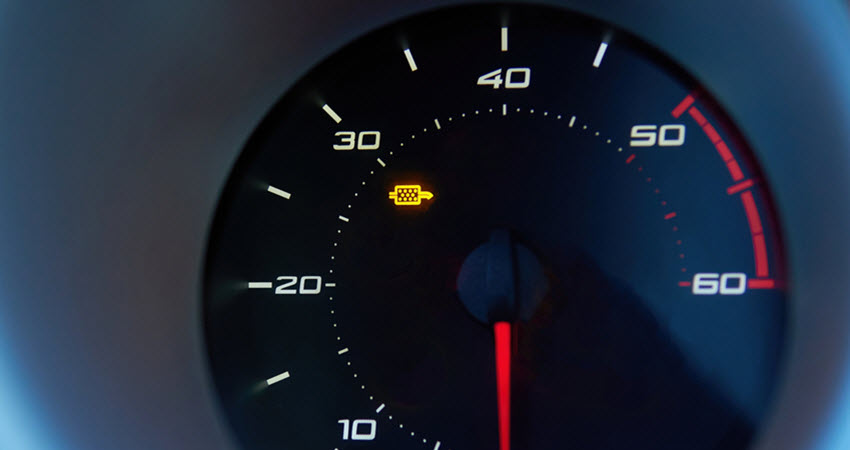Volkswagen diesel models use a Diesel Particulate Filter (DPF) to trap and diminish noxious exhaust gases. It’s like a catchall net that catches soot and other pollutant particles before they can escape into the atmosphere. Even so, that net can become clogged over time, creating big problems for your engine.
If you’ve spotted warning lights on your dashboard, aren’t accelerating as you should, or are filling your tank more regularly than normal, your DPF may be blocked. You can’t simply ignore it—and trying to might actually cause you serious engine damage and an expensive repair bill. Bring it to us at DART Auto, we’ll get it taken care of before it becomes a problem. Don’t wait until it is struggling to run.
So what is a Diesel Particulate Filter, and why is it so vital to your Volkswagen? Let’s break it down.
What Does a Volkswagen Diesel Particulate Filter Do?
Your Volkswagen’s emissions system relies on an important component called a Diesel Particulate Filter (DPF). Its task is to catch and hold soot generated by the diesel engine to prevent too much pollution. This soot builds up over time, but the DPF is designed to burn off the grime through a regeneration process at high temperatures to keep the filter unclogged.
However, when this process becomes thwarted—usually because of lots of short trips, or a malfunctioning system—the filter can clog up. Failing to address a blocked DPF can trigger warning lights, reduce engine efficiency, and result in a complete breakdown.
Risks of a Clogged DPF
A clogged Diesel Particulate Filter (DPF) isn’t just a minor inconvenience—it can lead to serious performance issues, higher costs, and even engine failure if left unchecked. Your Volkswagen’s engine relies on a clean DPF to properly expel exhaust gases, and when that filter is blocked, everything from fuel efficiency to drivability takes a hit.
1. Reduced Engine Performance
You can think of your DPF as a coffee filter. If it’s too full, nothing passes through as it should.” The identical thing occurs when soot accumulates in your Volkswagen’s DPF. The gases that are supposed to escape are retained, causing an undue amount of backpressure in the system. This makes your engine overwork simply to expel waste, resulting in:
- Slow acceleration: Your car might hesitate or not feel as responsive when you step on the gas.
- Power loss: A blocked DPF hampers the flow of air and makes it difficult for your engine to run at its optimum.
- Poor fuel economy: When the engine is struggling, it has to work harder, making it burn more.
2. Increased Fuel Consumption
A Volkswagen diesel is tuned for maximum efficiency, but as eco as the unit may be, once the DPF is blocked, it’s not going to get efficient. The engine needs to burn more fuel to produce sufficient power, requiring more frequent visits to the gas station. You may notice that your fuel mileage decreases — even though your driving habits are the same, the engine sounds noisier or seems strained, or you’re spending more money at the pump than you can explain.
Ignoring this problem doesn’t only impact your wallet; it can also raise emissions enough to incur environmental fines or trigger inspection failure in some municipalities.
3. Forced Limp Mode
Volkswagen designs its engines not to incur extensive damage, and limp mode is one of those internal safeguards. If your DPF gets very clogged, your car might automatically restrict speed and power so that you only have enough performance to get to a repair shop. This is a trip warning technique to prevent an entire engine failure but comes with huge drawbacks such as the maximum speed may be limited to 30-50 mph, the vehicles may become unresponsive even if the gas pedal is being pressed or the check engine light or DPF warning light will be on.
Getting limp mode is annoying, especially when it happens while you’re driving. This is a strong warning that your DPF needs immediate action.
4. Costly Repairs (or Worse, a Full DPF Replacement)
If a blocked DPF goes unattended for a long time, the additional pressure within the system will cause serious damage. This could mean:
- Cracked or broken turbochargers: Either excessive back pressure strains the turbo or this double whammy breaks the turbo.
- Exhaust system damage: A long blockage can overheat and weaken exhaust components.
- Total DPF failure: If the filter is so clogged that it can no longer be regenerated, it will have to be replaced entirely—and it can be one of the more costly repairs on a diesel.
Depending on the model and how fried it is, DPF replacements can set you back thousands of dollars. That’s part of why it’s so important to act quickly at the first sign of trouble, rather than letting the damage become irreversible.
Why DIY Fixes Can Make It Worse
The DIY approach to cleaning a clogged DPF with various methods is tempting to many vehicle owners; this often causes more harm than good. Using fuel additives or trying to remove and clean the filter yourself will only have the unintended consequence of damaging the delicate honeycomb structure inside the filter. In some situations, faulty processes can disrupt a regeneration cycle, leading to an exacerbation of the blockage.
Volkswagen DPF systems are complicated and require specialized tools and software to properly diagnose and repair. Rather than risk causing any more damage, bringing your vehicle to a trusted professional who can safely and effectively restore your DPF back to proper working order is in order.
Let our Professionals at Schearer’s Sales and Service Handle It
If your Volkswagen’s DPF warning light  is on or you are showing signs of a blockage, don’t wait for the problem to worsen. We, at Schearer’s Sales and Service provide diesel particulate filter diagnosis and cleaning help using our trained technicians with specialist equipment. We offer service to Allentown, Bethlehem, Easton, Emmaus, Whitehall, Macungie, and Hellertown, PA. For more information or to book an appointment, contact Schearer’s Sales and Service today and ensure your Volkswagen runs like new again.
is on or you are showing signs of a blockage, don’t wait for the problem to worsen. We, at Schearer’s Sales and Service provide diesel particulate filter diagnosis and cleaning help using our trained technicians with specialist equipment. We offer service to Allentown, Bethlehem, Easton, Emmaus, Whitehall, Macungie, and Hellertown, PA. For more information or to book an appointment, contact Schearer’s Sales and Service today and ensure your Volkswagen runs like new again.
